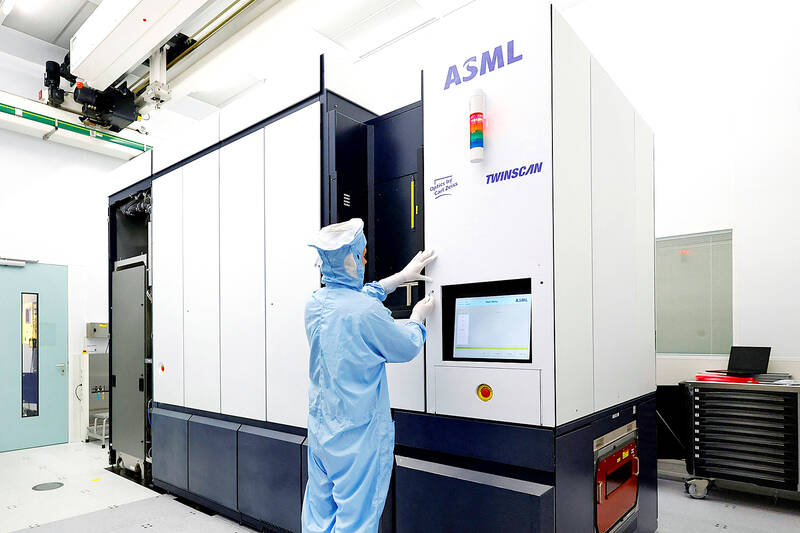Chip machine manufacturer ASML Holding NV on Monday said the Dutch government had partially revoked an export license for the shipment of some chipmaking equipment to China, following US export restrictions.
Shipments included certain lithography systems, the Veldhoven, Netherlands-based company said.
“A license for the shipment of NXT:2050i and NXT:2100i lithography systems in 2023 has recently been partially revoked by the Dutch government, impacting a small number of customers in China,” the company said.

Photo: Reuters
ASML dominates the market for lithography systems, which use lasers to help create chip circuitry.
The company said it does not expect the revocation or the latest US export control restrictions to have a material impact on its financial outlook for last year.
In the past few years, China has been ASML’s third-largest market after Taiwan and South Korea, but it was the biggest in the third quarter of last year, with 46 percent of the company’s sales.
Last year, the US announced new rules giving Washington the right to restrict exports of ASML’s Twinscan NXT1930Di machine if it contains any US parts.
Soon after, several Dutch lawmakers challenged the Dutch Minister for Foreign Trade and Development Cooperation Liesje Schreinemacher over whether the US had acted correctly in unilaterally imposing rules regulating the export to China of another ASML chipmaking machine.
“In recent discussions with the US government, ASML has obtained further clarification of the scope and impact of the US export control regulations,” the semiconductor equipment maker said in a statement. “ASML is fully committed to comply with all applicable laws and regulations including export control legislation in the countries in which we operate.”
In response, China called on the Netherlands to respect the law, the business environment and the stability of its and China’s markets, Chinese Ministry of Foreign Affairs spokesperson said yesterday.

Taiwan Semiconductor Manufacturing Co (TSMC, 台積電) yesterday said that its investment plan in Arizona is going according to schedule, following a local media report claiming that the company is planning to break ground on its third wafer fab in the US in June. In a statement, TSMC said it does not comment on market speculation, but that its investments in Arizona are proceeding well. TSMC is investing more than US$65 billion in Arizona to build three advanced wafer fabs. The first one has started production using the 4-nanometer (nm) process, while the second one would start mass production using the

‘SILVER LINING’: Although the news caused TSMC to fall on the local market, an analyst said that as tariffs are not set to go into effect until April, there is still time for negotiations US President Donald Trump on Tuesday said that he would likely impose tariffs on semiconductor, automobile and pharmaceutical imports of about 25 percent, with an announcement coming as soon as April 2 in a move that would represent a dramatic widening of the US leader’s trade war. “I probably will tell you that on April 2, but it’ll be in the neighborhood of 25 percent,” Trump told reporters at his Mar-a-Lago club when asked about his plan for auto tariffs. Asked about similar levies on pharmaceutical drugs and semiconductors, the president said that “it’ll be 25 percent and higher, and it’ll

When an apartment comes up for rent in Germany’s big cities, hundreds of prospective tenants often queue down the street to view it, but the acute shortage of affordable housing is getting scant attention ahead of today’s snap general election. “Housing is one of the main problems for people, but nobody talks about it, nobody takes it seriously,” said Andreas Ibel, president of Build Europe, an association representing housing developers. Migration and the sluggish economy top the list of voters’ concerns, but analysts say housing policy fails to break through as returns on investment take time to register, making the

CHIP BOOM: Revenue for the semiconductor industry is set to reach US$1 trillion by 2032, opening up opportunities for the chip pacakging and testing company, it said ASE Technology Holding Co (日月光投控), the world’s largest provider of outsourced semiconductor assembly and test (OSAT) services, yesterday launched a new advanced manufacturing facility in Penang, Malaysia, aiming to meet growing demand for emerging technologies such as generative artificial intelligence (AI) applications. The US$300 million facility is a critical step in expanding ASE’s global footprint, offering an alternative for customers from the US, Europe, Japan, South Korea and China to assemble and test chips outside of Taiwan amid efforts to diversify supply chains. The plant, the company’s fifth in Malaysia, is part of a strategic expansion plan that would more than triple